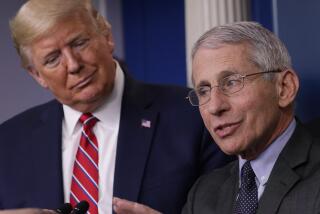Half-Million Expected to Die of Heart Attacks in ’85
MONTEREY, Calif. — Up to 1.5 million Americans will suffer heart attacks this year, more than half a million of them fatal, the American Heart Assn. predicts.
The 1985 edition of the association’s “Heart Facts” also notes a slowing in the annual increase of coronary bypass operations as other procedures to treat clogged arteries become available.
And the most recent figures showed that annual deaths from heart and blood vessel diseases, including strokes, have dropped slightly.
Cardiovascular ailments will cost the nation $72.1 billion this year, with $43.7 billion of that due to hospital and nursing home services, the report said. The remainder includes the costs of doctor and nursing services, medications and lost production due to disability.
The report, released at the association’s annual Science Writers Forum, outlines U.S. trends in heart disease based on 1982 statistics, the latest available from the federal government.
Deaths Drop Slightly
Cardiovascular diseases are still responsible for nearly half of all deaths in the United States, the association said, although the number of people who died from such ailments dropped slightly from 989,610 in 1981 to 985,040 in 1982.
Of the total cardiovascular disease deaths in 1982, 56% were from heart attacks, 16% from strokes, 3% from high blood pressure and less than 1% each from congenital heart defects, rheumatic fever and related heart disease. The remaining 23% were due to other cardiovascular ailments.
Public Health Service figures cited in the report showed other leading causes of death in 1982 were cancer, 435,550 deaths; accidents, 95,680; chronic obstructive lung disease, 59,980; pneumonia and influenza, 50,460, and 359,290 deaths from other causes.
Of the roughly 550,000 Americans expected to suffer fatal heart attacks this year, about 350,000 will die before reaching the hospital, the report said.
“The average victim waits three hours before deciding to seek help,” it said.
Up to 1.5 million, or 4,100 per day, will probably suffer some sort of heart attack in 1985, the report said.
Doctors have been using coronary bypass operations since 1968 to prevent heart attacks by grafting blood vessels from other parts of the body to the heart to divert blood around coronary arteries clogged by fatty deposits.
Surgeries Decrease
But while federal statistics show that 170,000 coronary bypass surgeries were performed in 1982, almost a 7% increase over 1981, the association noted that the number of such operations had increased by 20% in 1980 and by 16% in 1981.
The association attributed the slowdown to the availability of other procedures to treat clogged coronary arteries. One is balloon angioplasty, in which a catheter with a balloon tip is inserted into the clogged artery so the balloon can be inflated to clear fatty buildups.
Another alternative is the use of drugs such as streptokinase to stop heart attacks in progress, the association said, noting that “some doctors believe that the number of bypass surgeries will level off within a few years.”
The group said the cost of bypass surgery ranges from $15,000 to $20,000.
The American Heart Assn., a private, nonprofit agency funded by contributions, works to reduce early death and disability from heart disease, stroke and related disorders. It is based in Dallas.






